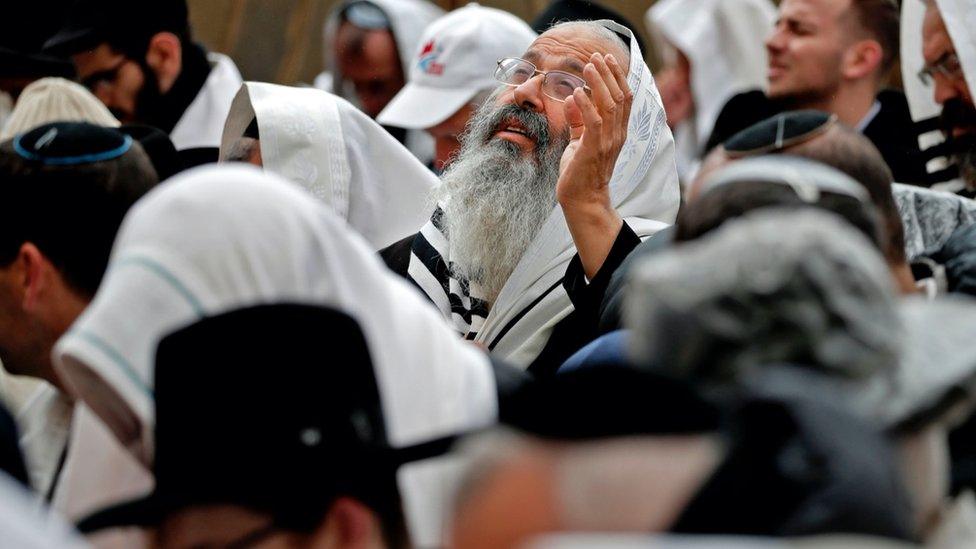Muslims in England facing Ramadan changes in lockdown
- Published
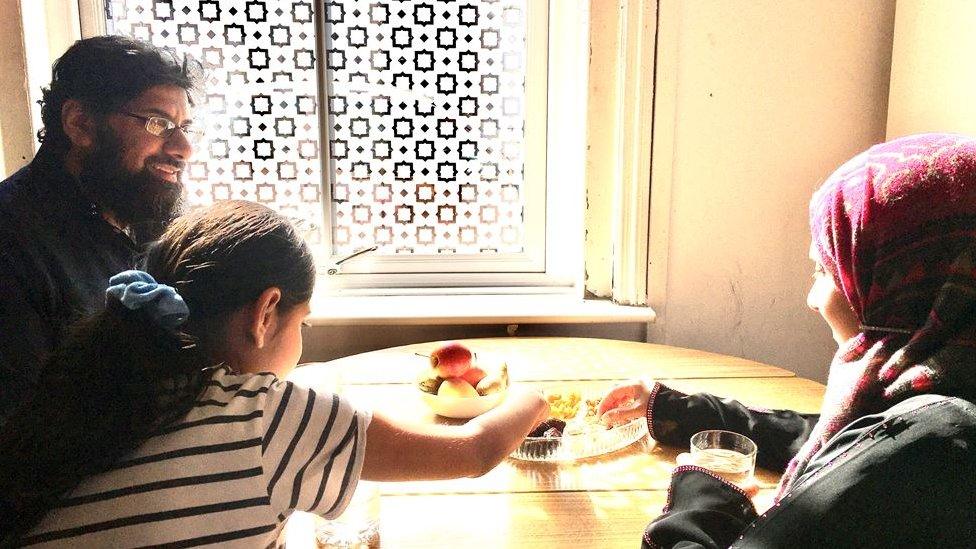
For Imam Sohayb Peerbhai and his family, this will be a very different Ramadan
The coronavirus pandemic means millions of Muslims living in the UK will be celebrating Ramadan differently this year.
During Ramadan, Muslims fast for 30 days during the hours of daylight. It marks the month the Koran was first revealed to the Prophet Muhammad.
Every evening when the sun has set, families and friends would usually get together for the Iftar meal to break the fast. Many people go to the mosque to pray.
But because of the lockdown guidelines, that will not be possible.
Publishing guidance on how to observe Ramadan, external, Harun Khan, secretary general of the Muslim Council of Britain, said: "The message for this Ramadan is clear: fast and pray at home and share Ramadan digitally.
"This is the way to worship Allah and help save lives."
Boy makes mosque at home for Ramadan in lockdown
Many Muslims have said they are looking to video calls and online communities as a way to observe the holy month.
Dr Habib Naqvi, deputy director of the NHS Workforce Race Equality Standard agreed. He said: "This is another critical period where Muslims, along with other communities, should make use of online platforms and alternative approaches to communicate with family and friends and stick with government guidelines regarding social distancing."
'Never done this before'
For Sohayb Peerbhai, this will be a very unusual Ramadan.
He is the Imam of Craven Arms Islamic Centre in Shropshire and lives in a flat above the mosque with his wife, Asiya, and two daughters Rumaysa, 13, and Rayhana, nine.
During lockdown, the mosque has been closed but Mr Peerbhai has been conducting the usual prayers inside it, alone.
"It is obviously very strange, I have never done this before," he said.
"If we had spoken six weeks ago and told me we would be in this position, I never would have believed it."
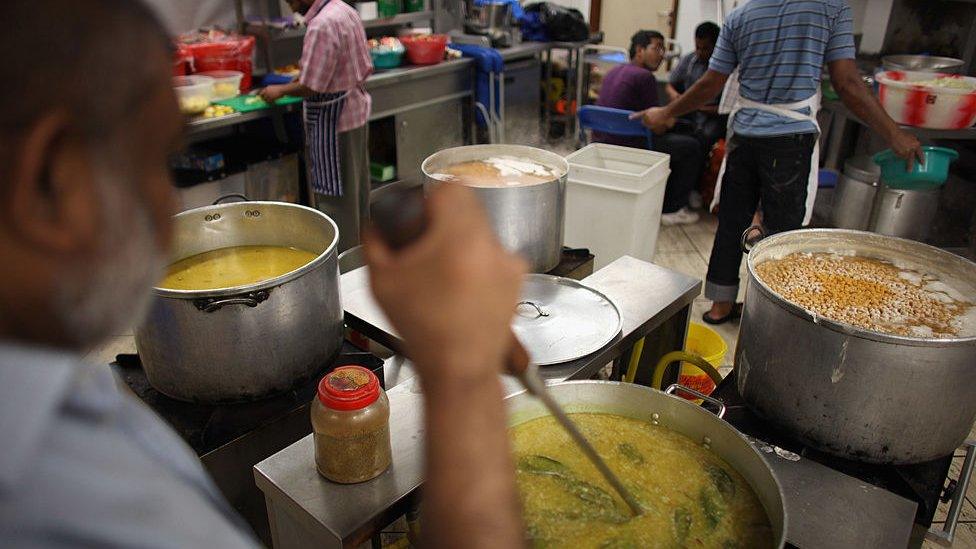
Often, families and communities join together for their evening Iftar meal, but many will be coming together digitally during the lockdown
Usually during Ramadan, he said, about 100 people would meet nightly at the mosque for their prayers and to have their evening Iftar meal together.
But this year, he will be having the meal with his family.
"It will just be ourselves with family, a bit of Facetime or Zoom with family or friends occasionally," he said.
"My two girls might call their cousins during dessert, for a laugh.
"For someone like myself, an imam, I am very busy every year. This will be quite good, to do it with my family, just the four of us, it is something personal.
"We will still be socialising, but we are also very safe and healthy and sticking by rules."

Talawat Rahman said being unable to travel between his home in Birmingham and his parents' home in Newcastle will be difficult
Talawat Rahman is living in Birmingham with his friend Shabir Ahmed, Shabir's parents, Rosemin and Shafiq, and their grandson, Abdul-Rahman. It means Talawat will be away from his parents and siblings during Ramadan and for the festival of Eid al-Fitr, which marks the end of Ramadan.
"One reason I decided to stay in Birmingham and didn't return to London after university was the community atmosphere here," he said.
"In Ramadan, thousands congregate to share their evening meals and build a family they didn't have before, it is a magical time. Going without that will be very different.
"I'm used being able to go every Ramadan between Birmingham and my parents in Newcastle, this will be the first time I can't be with my younger siblings, with my parents, more than ever I will be relying on digital resources to stay in contact with them.
"On Eid day waking up and it just being another day, where the most exciting place I will be able go is to Tesco and back after a long 30 days fasting and reflection and prayer, is pretty sad,
"I won't be able to go to my parents' home, I'm not the only person who will have to experience that for the first time, but that will be an emotional challenge, to be honest."
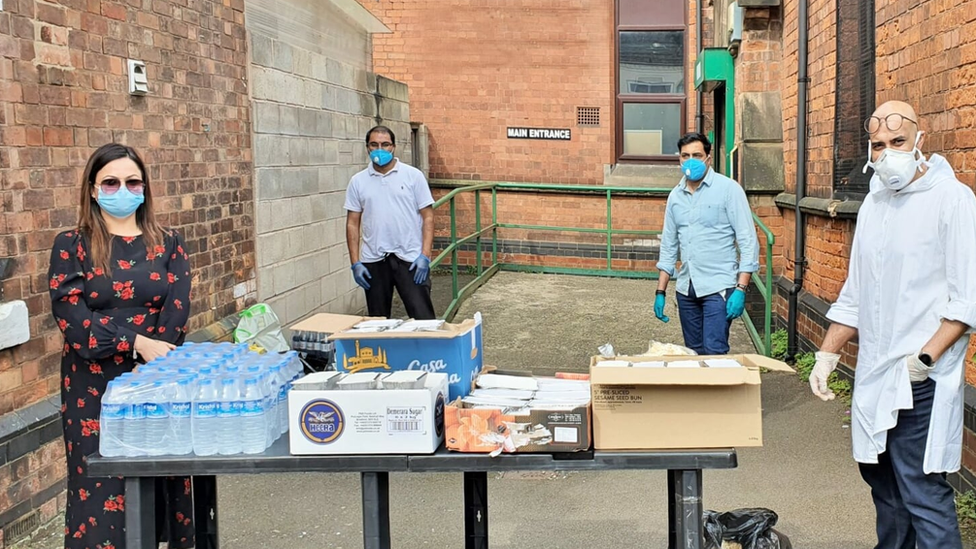
Majid Waris (far right) said Ramadan is a month to reflect on yourself
In Burton-upon-Trent, Majid Waris is part of Humanity Unites, which runs a regular food bank in the town.
It has now started delivering food parcels and has been allowing people to collect food in way that meets social distancing guidelines.
"As Muslims we are taught to be charitable in our nature, Ramadan is perfect because it is like a whole month to reflect on ourselves," he said.
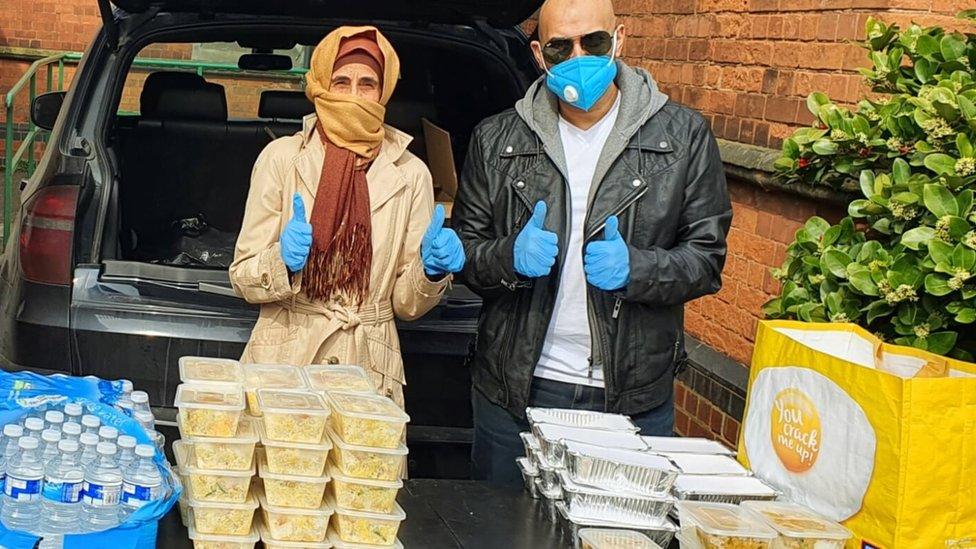
Humanity Unites is giving out food to the community during Ramadan
"It is a month to reflect and recalibrate, that is the best way I can put it.
"It helps you appreciate what you do have in life, what is important, which is kind of what we are being forced to do now during the lockdown.
"At Ramadan it is a little bit challenging, because we are cooking food while fasting, but I see it as a test for humanity, how are you going to continue fulfilling duties while being challenged, and it gives you a better understanding of the make-up of society and what is happening out there."
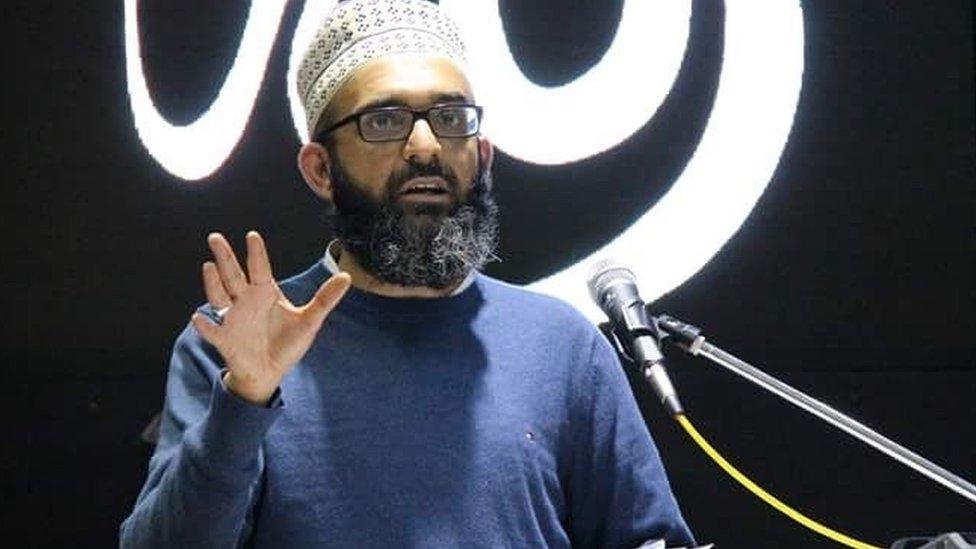
Ather Hussain said the lockdown will not stop people from looking out for each other
Ather Hussain, an Imam from Leicester, said the community had already felt how things have changed.
"Many mosques have gone to the effort of picking up the phone and ringing regular worshippers and seeing how they're getting on at home and many have doubled up as food couriers," he said.
"They are still serving humanity. The nature of the worship has changed."
He said there were additional prayers, unique to Ramadan, which they would miss out on.
"The other part is the social aspect. We share food together, we sit and pray together, and spur each other on," he said.
"We will still fast and pray. We will give money online.
"We will still look out for one another."
He said, instead of worshippers going to the mosque to break fast in the evening, most mosques in Leicester would be broadcasting on Facebook live to share the moment.
Amina Koroma, an actor and playwright from London, has set up Ramadan Online, an online facility for women to maintain community and achieve their spiritual goals during Ramadan.
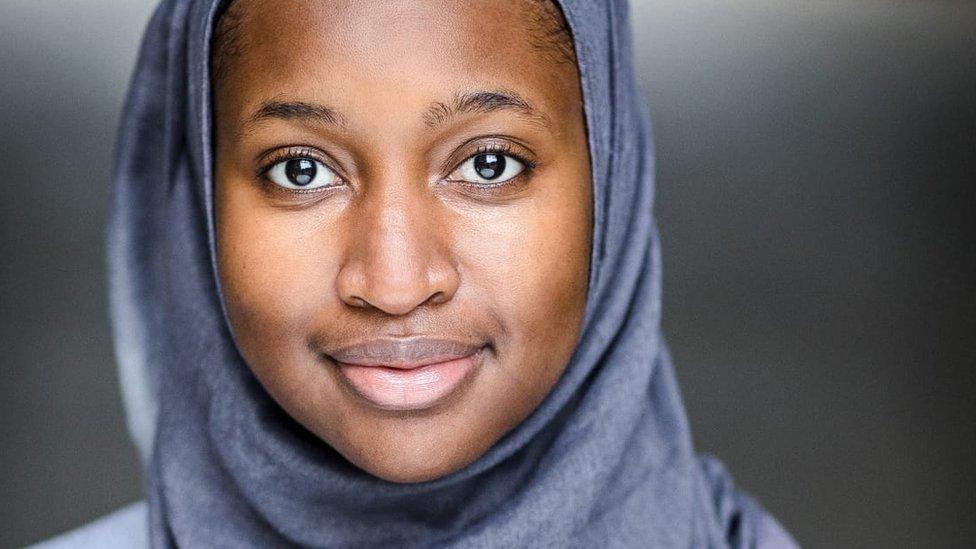
Amina Koroma set up Ramadan Online to help women achieve their spiritual goals during Ramadan
"It is such a communal time with the mosque as the hub where we come to pray, come to eat, just catch up with friends and family.
"If we are working so much during the year, we can take this time to focus inwardly, and the mosque is the place that helps us to do that.
Allow X content?
This article contains content provided by X. We ask for your permission before anything is loaded, as they may be using cookies and other technologies. You may want to read X’s cookie policy, external and privacy policy, external before accepting. To view this content choose ‘accept and continue’.
"I thought the lack of access might have shaken them a little bit, these are really unprecedented circumstances. I would say they have maybe never experienced a Ramadan like this before, and I wanted to create a resource that would help them find some semblance of community."

A SIMPLE GUIDE: How do I protect myself?
AVOIDING CONTACT: The rules on self-isolation and exercise
HOPE AND LOSS: Your coronavirus stories
LOOK-UP TOOL: Check cases in your area

Follow BBC West Midlands on Facebook, external, Twitter, external and Instagram, external. Send your story ideas to: newsonline.westmidlands@bbc.co.uk , external
- Published23 April 2020
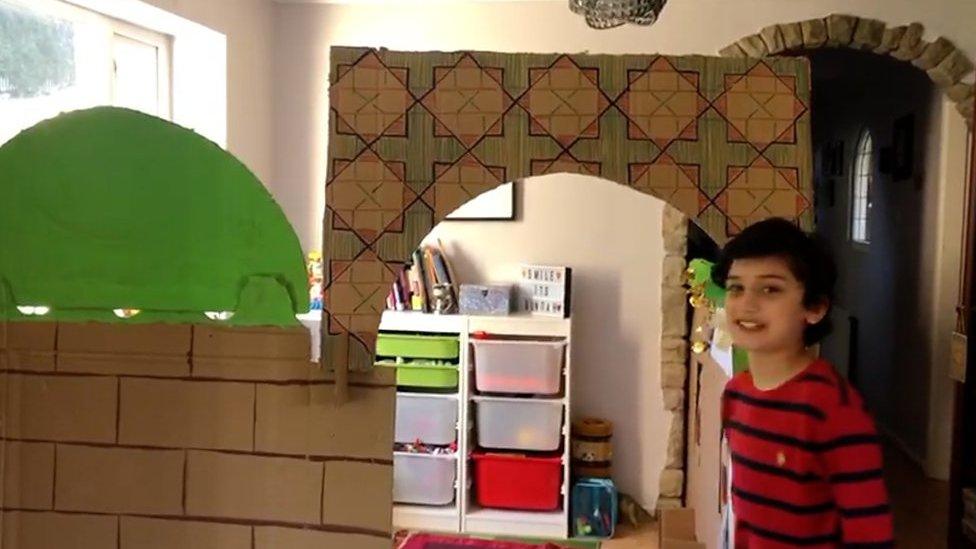
- Published21 April 2020
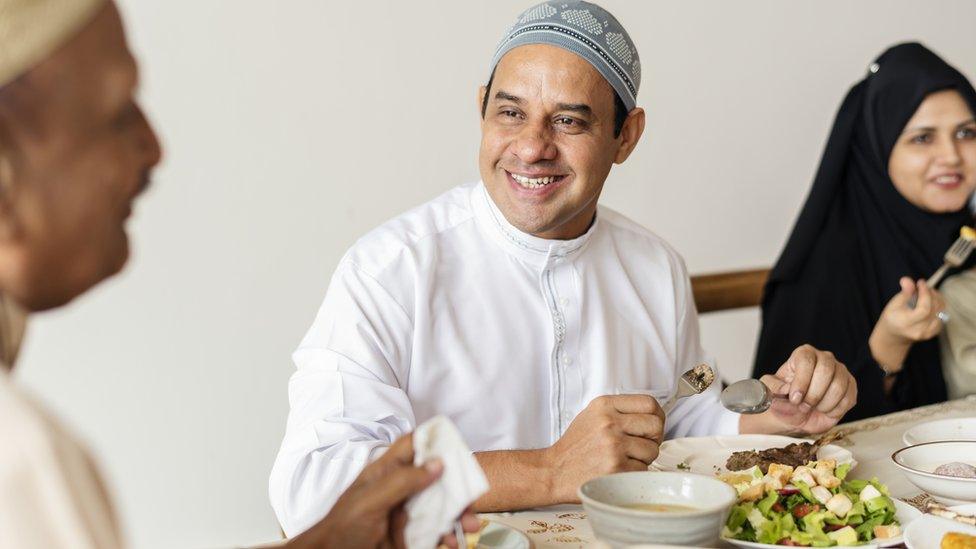
- Published8 April 2020
